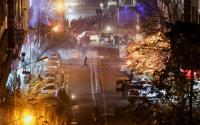4 January 2008David Hayes
The fact that history is lived forwards and understood backwards keeps journalists and historians in business, but can also offer them convenient escape from the responsibility to engage with the complicated “now”. For the present too is history, demanding to be situated in dynamic as well as linear ways.
The attempt to make sense of a moment - to “think the present historically” as Walter Benjamin put it - is even more necessary in a world whose accumulating problems require fresh thinking and urgent, imaginative solutions. We have already lost a lot of time to confront some of them - global warming, Israel/Palestine, weapons proliferation, a political strategy to address terrorism - and may have less time (on these and others) than we think.
What is the world waiting for? An easy answer is new leadership with a sense of global responsibility - a deficit that is almost everywhere palpably clear: the United States, the United Nations, Europe, the rising power of China, the resource-rich ones of Russia and Iran. Too easy, because at a deeper level the absence of solutions is not only the responsibility of those who directly govern; it also belongs to the world’s flawed institutions, redundant ideas, and disaggregated social ethics.
2008 [0] is not too late to begin the work of repair. For as the first decade of the 21st century nears its end, it is becoming ever more evident that the processes of transformation the world is experiencing are - in their scale, their speed and their character - complex and daunting to a perhaps unprecedented degree. In almost every geographical region and sphere of human life, immediate tensions and challenges are also the visible sign of profound structural problems that demand coordinated, focused attention.
Twelve trends
It is the way these problems - political, economic, social and environmental - are addressed that will shape the course of human events in 2008. A list of just ten of the most prominent ones suggests the size of the task, though in itself this makes them no more comprehensible or less formidable:
the long-term shift of global economic and financial power from the United States and Europe to Asia, especially China the unavoidable and pressing [2]threat of global climate change the economic and social effects of globalisation (among them greater inequality within countries, and the increasing danger of global epidemics) armed conflicts, insurgencies, and “frozen” disputes, often accompanied by humanitarian crises (among them Iraq, Afghanistan, Darfur, southeast Turkey, Somalia, the Democratic Republic of Congo, Georgia, southern Thailand, and western Sahara) geopolitical quarrels with great destructive potential (among them those involving Iran, Israel / Palestine, Kosovo / Serbia, China / Taiwan, and Pakistan) the crisis of states where citizens’ lives are especially degraded (among them Burma, Zimbabwe, and North Korea) the problems of nuclear proliferation and the spread [2] of other weapons of both mass and small-scale destruction (among the latter small arms and cluster-bombs) the change in world order signified by the rising confidence of emergent powers fuelled by incremental strategic influence and / or “resource nationalism” (among them China, Russia, Iran and Venezuela [2]), alongside the confusion and misdirection of the United States the impacts of Islamist and other forms of radicalisation on nation-states in the Muslim world and beyond; more generally, the emergence of a global Muslim political identity as part of what Malise Ruthven [2] has called “the divine supermarket” the consequences of immigration and “people flow” on both sending and receiving countries and across the range of political, social and cultural life (not least, on attitudes towards national identity and social diversity) the impact of new technologies (the internet, mobile phones, social networks) on human experience, identities and life-chances the new vulnerability of democracy, both as idea and as uniquely legitimating political model [3] - in face of authoritarian regimes and of crass, insurgent populism in democracy’s western, liberal-democratic heartlands.Three contradictions
It is a component of the current global predicament that so many of these issues inhere in and can be understood only in relation to one or more of the others. It is an indication of the nature of this predicament that the effect of public discussion of many of them is so infused with contradiction. Three examples illustrate the point.
First, the sheer weight and difficulty of many of the ten problems - from the future of Burma [3] and Palestine to managing the impacts of migration and climate change - can create among citizens weariness or passivity; the difficulties have been there for so long, so many powers and factors seem to conspire against practical solutions, is progress really possible? At the same time, the very interdependency of these problems (the Kosovo [3] question is at once intercommunal, transnational, regional, and global, and in this is emblematic) is an index of their political effectivity; where so many have a stake, commitment itself can be an antidote to the luxury of despair.
Second, the spread of dynamic communications technologies makes people feel weaker and stronger at the same [3] time. The instantaneity of information and opinion - especially via the relentless “24/7” news-cycle - routinely solicits a disempowering feeling of unmanageable overload that encourages dependency on unreliable or even extreme sources; if there is so much to process and filter, why not trust ideologies of power and radical simplification to do citizens’ work for them? Yet the same technologies that spur a retreat into enclaves of tribal agreement also increase people’s ability to expand their knowledge, find innovative ways of holding power to account, and develop their own enlightening channels of social connection and mobilisation.
Third, the disarticulation between the individual and the collective is an increasingly clear part of the contemporary global condition. This too is highlighted in the way that the uses of technology so often fragment and dissolve as well as reinvigorate social bonds. More broadly, the retreat or collapse of great collective projects - the “grand narratives” of political ideology - has been accompanied by an intense search for replacements which (in anti-globalisation, environmentalism, or regenerative nationalism, for example) have not yet found real political traction; while the advance of a global consumerist society that appeals to individual aspiration seems equally to define the age.
Amid these contradictions, and in the absence of ideas that are both enlightening in themselves and speak to the experiences of the majority of citizens, the active search for new forms of political community often takes regressive or wasteful directions. What remains are disparate, uncoordinated attempts to find coherent responses to global problems without the structures of governance, the institutions, the agents, the ideas and the ethics - and the political leadership - essential to resolving them.
More than ever, we are (in Kant’s words) “unavoidably side by side”. A combination of political polarisation, rampant inequality and injustice, the seductions of dogma and the availability of destructive weaponry increases the perils of ignoring this reality. A “global we” is the beginning of wisdom; but how to get there? As 2008 opens, Minxin Pei [4]’s description of China’s political dilemma - the “trapped transition” - seems applicable to the world as a whole.






